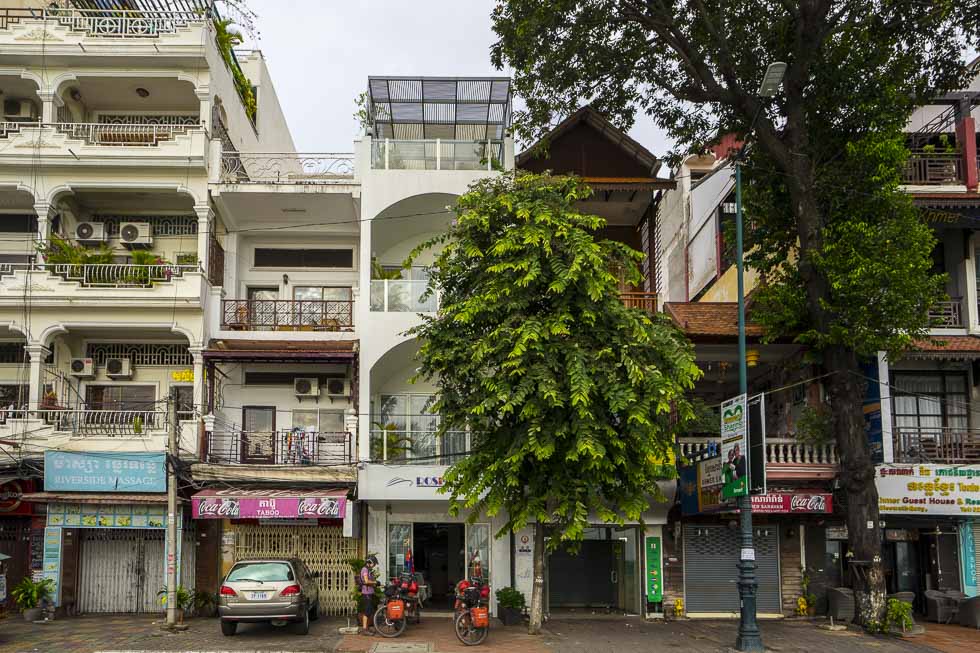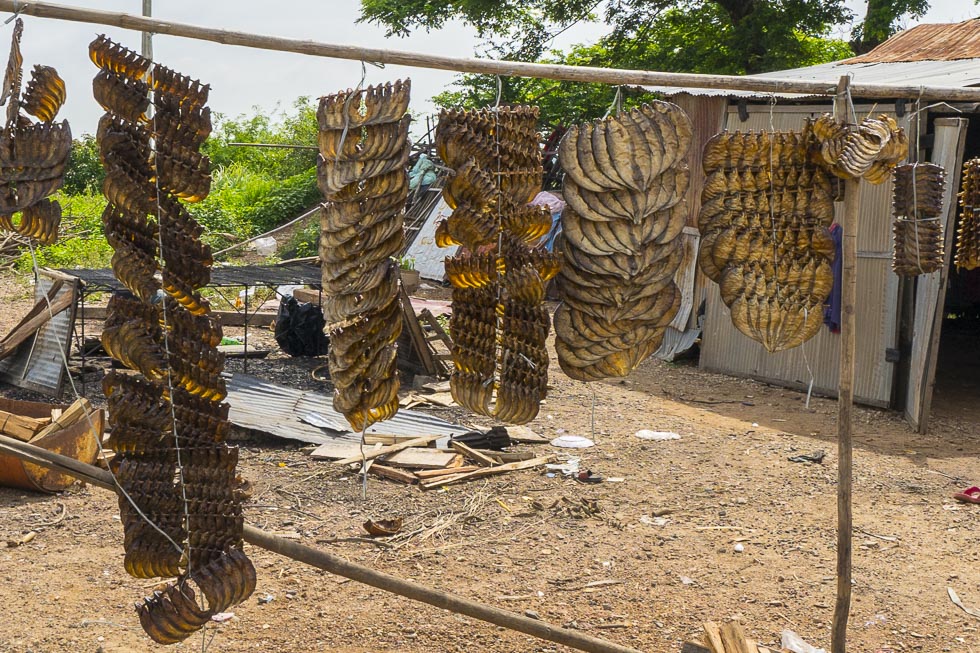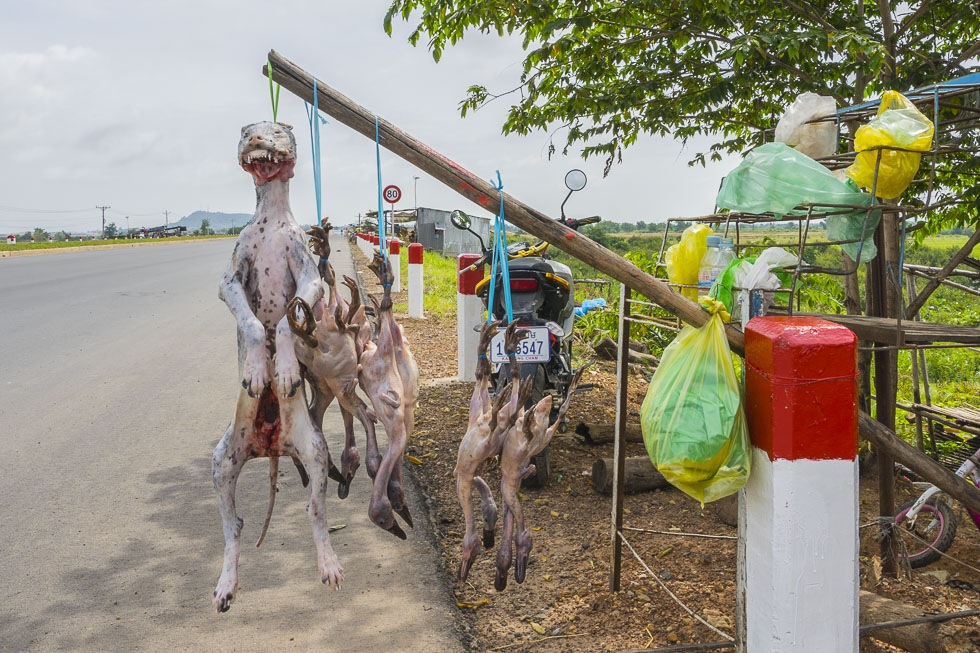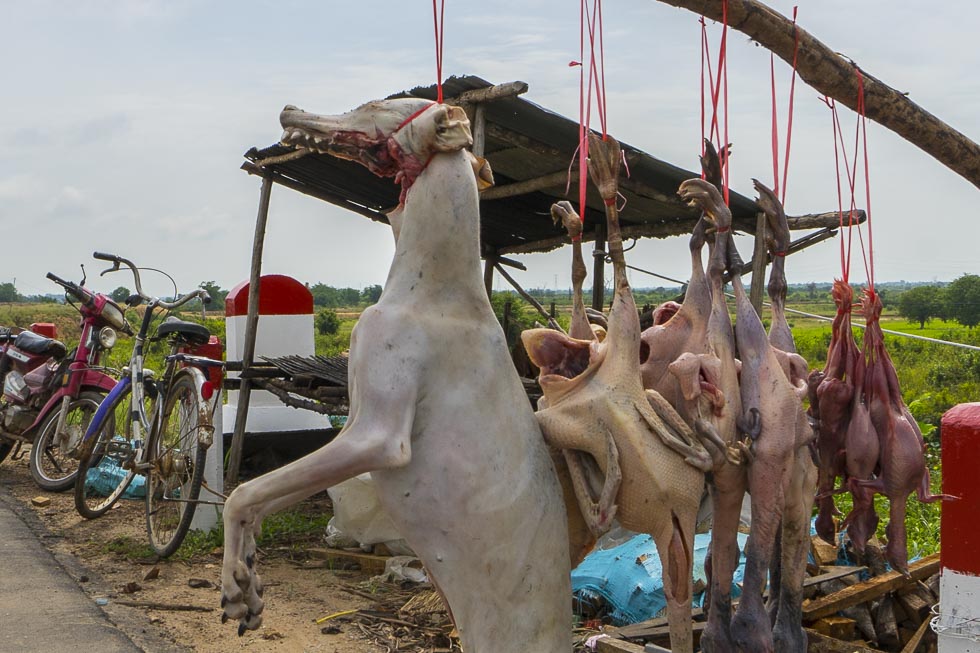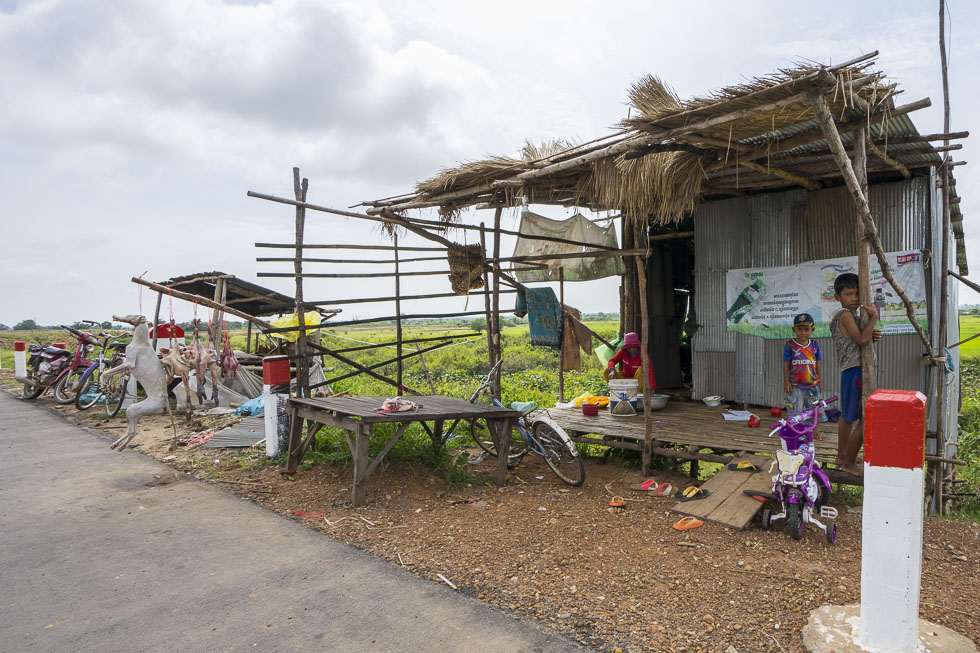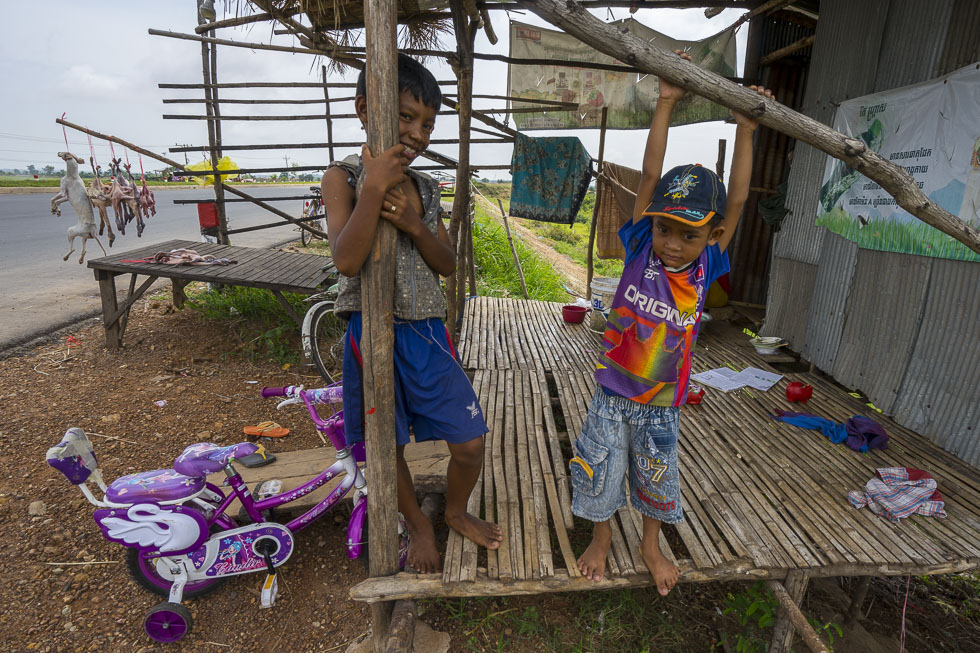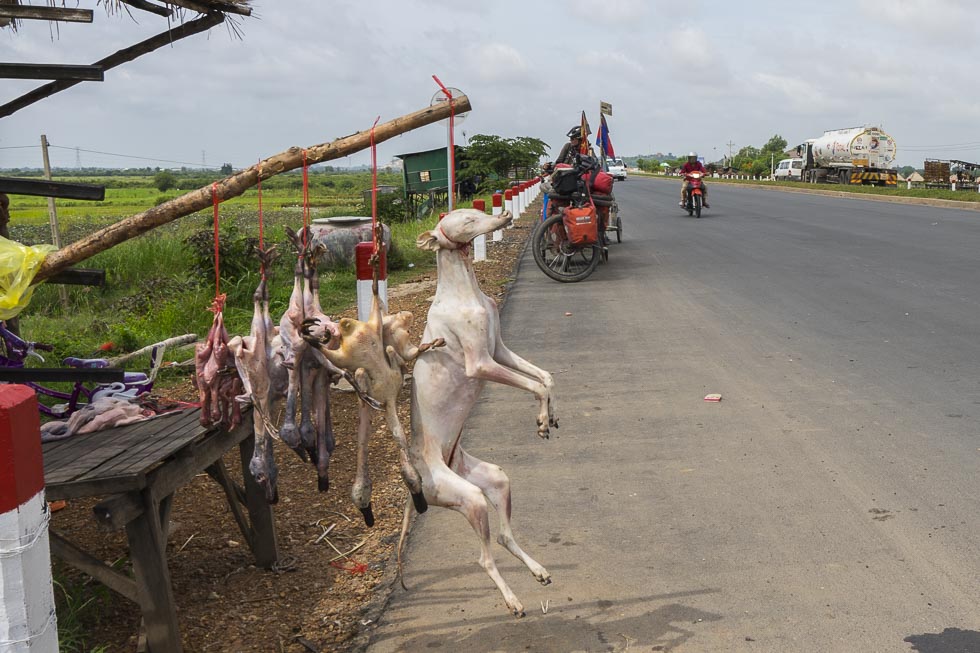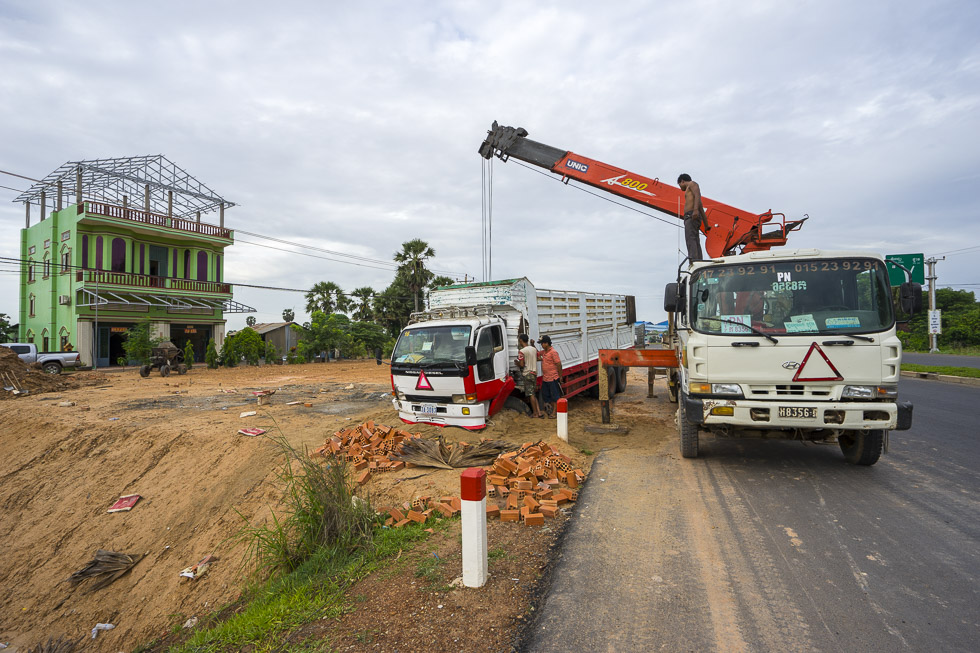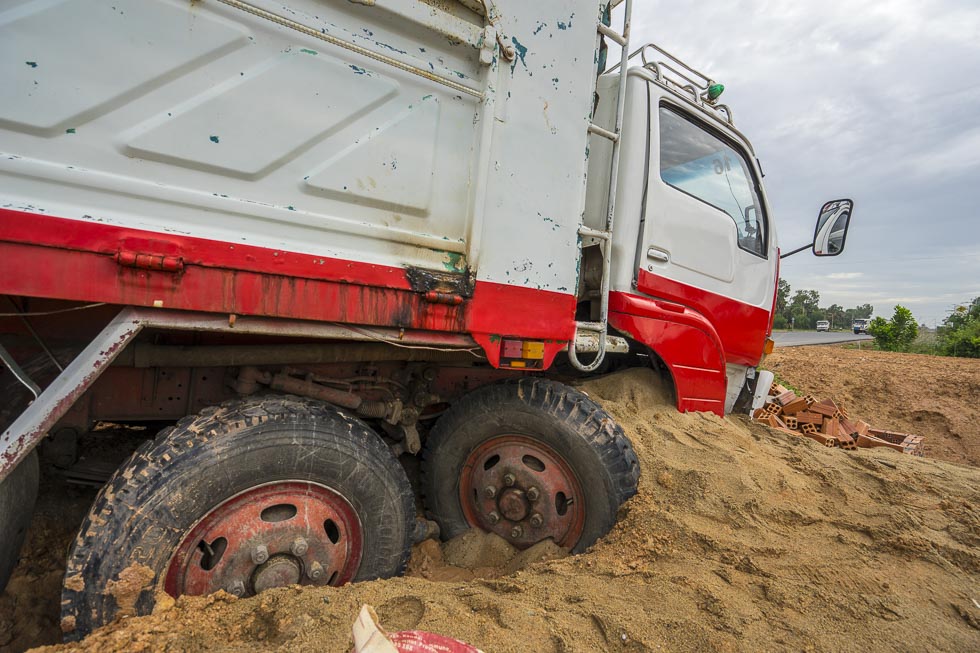
Skinned dogs
N 12°01'48.4'' E 104°58'24.4''
Date:
11.06.2017
Day: 712
Country:
Cambodia
Location:
Soben laor Guesthouse
Latitude N:
12°01’48.4”
Longitude E:
104°58’24.4”
Daily kilometers:
71 km
Total kilometers:
24,008 km
As the crow flies:
54 km
Average speed:
24.6 km/h
Maximum speed:
27.8 km/h
Travel time:
2:56 hrs.
Soil condition:
Asphalt
Maximum height:
30 m
Total altitude meters:
71.212 m
Altitude meters for the day:
35 m
Sunrise:
05:34 pm
Sunset:
6:24 pm
Temperature day max:
33°C
Departure:
07:25 a.m.
Arrival time:
10:30 a.m.
(Photos of the diary entry can be found at the end of the text).
LINK TO THE ITINERARY
As early as 6:00 a.m., the ball of sunlight fires its rays down through the gaps in the overripe monsoon clouds. The capital is slowly starting to steam up. Tuuuhhht! Tuuuhhht! Tuuuhhht!, the honking of the awakening traffic roars up to us. We sit on the high terrace of our apartment and eat a ripe papaya with great relish. “Are you happy that it’s going to continue?” I ask Tanja. “Yes, I’m really curious whether the ancient temples of Angkor Wat are as fascinating as everyone says.”
“Watch out for the edge,” I warn Tanja, so that the heavy bike trailer doesn’t bang against the freshly whitewashed wall of the narrow stairwell. It’s 7:00 am. The heat has increased. Sweating and groaning with exertion, we maneuver the heavy bike trailers from the third floor to the first floor. Once at the bottom, I get our bikes ready in front of the small hotel with its eight rooms, while Tanja climbs up a few more times to fetch the Ortlieb bags. Over the past two years, it’s been an exhausting procedure that we’ve never really got used to.
At 7:25 am we are back on our trestles to pedal them out of Phnom Penh. We pass the royal palace, which is just about to awaken from its nightly rest. A few kilometers further on, the morning rush hour sucks us into its wake. As we leave the hustle and bustle of Phnom Penh behind us, the dark storm clouds are evaporated by the increasing heat. A newly paved, black, fairly wide strip of asphalt separates the lush green rice fields into two parts and allows us to make good progress. “Have you seen the cat?” Tanja’s question flies forward to me. I apply the brakes and stop. “What did you say?” I ask her, not really having understood. “There’s a skinned cat hanging on a stick at the stall back there. I think they sell cats to passers-by here.” “Cats? Hm, I thought eating cats and dogs was now illegal in Cambodia?” “Do you think anyone in this country abides by bans? I’m telling you, there’s a cat hanging there. I’m quite sure,” Tanja replies. I grab my camera and run back to the stall. “There’s only dried fish hanging here!” I shout to Tanja, who has stopped by the road to look after the bikes. As I raise my camera to my eye to take a picture of the rusty corrugated iron hut, a young woman hisses at me. I immediately put the camera down, turn on my heel and leave the unfriendly place behind me. “There’s no skinned cat hanging from the pole,” I repeat to myself, back at Tanja. “That’s strange. Maybe the woman got rid of them quickly when she saw you coming?” “Maybe,” I say, swinging myself back into the saddle.
Barely 500 meters further on, we are shocked by a shaved dog. With a colorful plastic ribbon around his neck, he hangs from a wooden peg with a few plucked ducks. “I can’t believe it!” I shout, pulling the brakes again to get a closer look. Man’s four-legged friend met a terrible end here. His tormentors cut off his lower jaw and tied it to the peg with a plastic cord on the remaining upper jaw. His belly was opened, like a goat’s, to take out the innards. I have to control myself not to throw up on the hot asphalt. Ajaci, sitting in his trailer, whimpers. Will he realize that his own kind has been hanged here? I take a look at the nearby hut. A woman looks at me in a friendly manner. Two children stand giggling shyly on the simple little terrace made of bamboo and watch our e-bikes. No doubt the people living here are destitute and no doubt the family earns some money with the slaughtered dog in order to survive. How could they be charged? We, who come from a rich country and can eat so much every day until we become overweight and die of civilization diseases such as high blood pressure, diabetes, alcohol addiction etc. due to our prosperity, while the family here lives at subsistence level. ‘I wonder if the father is on a lucrative hunt for dogs right now,’ it goes through my mind. My thoughts fly back to Phnom Penh. During one of our evening walks through the city, we passed one of the many food stalls. Smoke rose from the fireplace and drifted into the poorly lit alleyway. A few men sat around a rickety table and ate something we couldn’t define. We learned that they enjoyed the offal of a dog. “It’s delicious!” one of them called out to us with a laugh. “Do you want some of that too? Come and sit down and have a beer with us,” his buddy asked us. We learned that they were dog catchers and were celebrating today’s successful hunting day with a few beers. “It’s good for your potency!” shouts the chef, stretching his dog’s jaw upwards. Tanja and I looked at each other and to hear more we covered up our horror. In the course of our conversation, we learned that the demand for dog meat continues to rise despite the ban. For this reason, a veritable black market for stolen dogs has developed in Cambodia.
“Every day I am offered animals by my dog catchers. If they look healthy, I pay them US$ 30, depending on their size. As you can see, you get good quality from me and I promise you that my goods are fresh. And let me tell you, it tastes fantastic. All you have to do is drizzle a little chili sauce over it and you won’t even notice that it’s dog meat. It is really tender, literally melts in the mouth. Come and try a piece”, he insisted, wanting to invite us. When we didn’t move, he said: “It doesn’t matter whether it’s dog, goat, pig or cow. Meat is meat. Don’t you agree?” asked the man at the barbecue, who was obviously in a great mood. “Sure,” I replied, thinking to myself that it really is just a view of different cultures. However, people do not usually keep goats, pigs or cows as pets, and it is also a fact that people do not usually share family life with pigs and goats. So they are never really family members who end up on the barbecue. What’s more, these animals are generally not stolen and are not horribly tortured before they die like some unfortunate Cambodian dogs. To improve the taste, they are often beaten to death. In this way, adrenaline is pumped into the meat, which is very important to dog gourmets.
“And how do you catch the dogs?” I wanted to know from the men at the table, who seemed to be well disposed towards us. “During the day we earn our money by ferrying people like you around in our rickshaws and at night we go hunting.” “Dog hunting?” “Of course, not hunting humans, ha, ha, ha,” one of them replied, snorting with laughter. “And how does that work?” I asked. “We have a homemade sling on a stick. My buddy here drives the moped while I sit on the back seat armed with the sling. As soon as we’ve spotted a lure like this, we head off. I’ve gotten really good at it by now. I slip the snare over his head and off we go. We drag the dog behind us until we are safe. The lure is then usually unconscious or dead. It no longer makes a sound.” “What do you mean by safety?” I asked. “Well, we have to be careful. The dogs belong to someone. If the owner catches us, there might be a fight.” “Yes, I’ve heard that many a dog catcher has been killed by the villagers in Vietnam,” I agreed with him. “Not only in Vietnam,” he replied, furrowing his brow. “Don’t you have a guilty conscience when you kill the family members of your fellow human beings so brutally?” asked Tanja. “Yes, we already have, but how are we supposed to feed our family? Catching dogs is a great way to survive, and a very good one at that.” “It’s also a bit of fun,” one of the men interjected with a laugh, finishing his bottle of beer before opening another one seconds later. “That’s right, we catch several animals on a good night. To celebrate our success, we go to the bar. We treat ourselves to a few beers and sometimes a pretty woman.” “And what do your wives say?” I wanted to know. “Ummmppfff,” he laughed. “Our wives? They don’t need to know everything.” “Let’s go,” Tanja urged me, whereupon we said a friendly goodbye and left the food stall with the cheerful dog catchers.
The father of this family is also one of the unscrupulous dog catchers. The only difference is that he doesn’t sell his prey to a snack bar or restaurant, but kills it himself, takes it out and sells it to passing customers on the street.
We get back on the saddles and cycle on. Every few hundred meters we pass small stalls selling freshly slaughtered dogs. From the looks of it, the arterial road from Phnom Penh in this section is known for this macabre delicacy.
At 10:30 a.m. we arrive at the edge of a small village after 71 kilometers of the day at an accommodation that is not recognizable to us from the outside at first. Only our intuition makes us stop and ask if there is a bed here for the night. The owners of the house are very friendly. Although no one here speaks English, we understand each other straight away. While I park our bikes in the living room at ground level, Tanja is helped to transport the equipment to the second floor. Afterwards, the daughter of the house covers the beds with fresh sheets. “Phew, good to have found a place to stay for the night again,” I groan, settling into my camp chair. Wuuuummmm!, it thunders violently and brutally as I type the first lines into my laptop. “What was that?” asks Tanja, deeply shocked. “An earthquake?” I ask uncertainly. We jump up and look out of the window. “I can’t believe it,” I say. Where we were standing a short while ago, wondering whether the house was renting out rooms, a truck has crashed into the ditch. “Lucky,” says Tanja…
If you would like to find out more about our adventures, you can find our books under this link.
The live coverage is supported by the companies Gesat GmbH: www.gesat.com and roda computer GmbH http://roda-computer.com/ The satellite telephone Explorer 300 from Gesat and the rugged notebook Pegasus RP9 from Roda are the pillars of the transmission.
